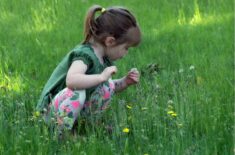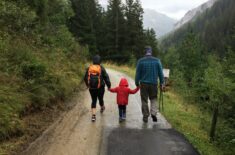Toddler Age Range & Things To Expect
The toddler age ranges from 12 months to 36 months or one year to three years old. (1)
This age range features several child development milestones, with young children trying to master basic skills like walking, communication, self-feeding, etc. Potty training usually also starts at this age. (1)
Toddlerhood can be challenging for parents. (1)(2)
It’s a time when you might get into power struggles with your child because they want to exert their autonomy. They might reject foods (like new ones they haven’t tried or even old favorites). They start wanting to make choices for themselves. They may even say “no” more often than “yes.” (1)
Temper tantrums are also common. (1)(2)
No wonder the age range is also known as the “terrible twos.”
Jen Young, a CDFC (Child Development and Family Center) teacher at Northern Illinois University, explains this is normal. Toddlers may throw tantrums for varied reasons, such as having trouble communicating. They may be overwhelmed by what they want or need, yet most adults don’t understand what they say. (2)
At this stage, your little one grows from a baby into their own “little person.” They now have their own opinions, wants, thoughts, and likes. (2)
Young advises: (2)
“It may be hard to realize that your baby is growing up, and it may be frustrating because your child is coming across as stubborn, but it’s inevitable that children are going to grow.
Celebrate your 2‐year‐old and accept the challenges that come along with it.”
What are the other things to know about the toddler age? What milestones are expected at this age range? What can you do if you’re concerned your child is developing slower and is behind other kids their age? How can you help your toddler achieve their best development and learning potential?
Keep reading to find out. We’ll also share some positive parenting tips to help you raise a confident and happy child.
Why Is It Important To Know The Correct Toddler Age Range?
Every child has a different personality. However, kids from the same age bracket usually go through similar processes and achieve the same milestones within their developmental stage. (3)
Knowing their correct age range and the developmental expectations at this age can help you: (3)
- Understand what they’re going through
- Empathize with how they might feel (or see the world through their eyes)
- Find and provide guidance or learning opportunities for their age range
You’ll also know which items are appropriate to use for their age, such as:
- Toddler car seats
- Toddler floor beds
- Toddler formula (e.g., Serenity Kids’ Toddler Formula)
- Toddler toys
Definition Of Terms
Toddlers
- Children 1-3 years old
- Comes from “to toddle” (which means to walk unsteadily because kids are still learning how to walk and balance at the start of the age range)
Is The “Infant” Stage The Same As The “Baby” Stage?
Yes. These two terms are synonymous. They can be used interchangeably to mean a person in their first year of life. However, definitions can vary. Often, “infant” refers to younger babies, particularly those younger than one year old, while “baby” refers to a child from newborn to toddler.
Is Age 3 A Toddler Or What Are They Called?
A 3-year-old can still be called a toddler. However, it’s the upper limit of the toddler years. They’re also old enough to be called a preschooler. Because terms can also vary, “preschool” age can also mean a child from 2-5 years of age.
Is 4 Years Old Still A Toddler?
No. Four-year-olds are considered preschoolers.
Is A 5-Year-Old Kid A Toddler Or What Are They Called?
No. The upper limit for preschoolers is five years of age. They can also fall under the “young children” or “grade schooler” bracket.
What Stage Is After Toddler?
- Preschooler
- Grade schooler
- Young child
Developmental & Growth Milestones For Toddlers
Independence, Personality, Self-Care, & Refusal To Receive Help
Most toddlers go through or achieve the following milestones within their age range: (2)(3)
- Mastery of basic skills such as talking, walking, and sleeping through the night
- Self-feeding
- Potty training or bladder and bowel control
- Try regulating their emotions
- Seek autonomy via an “I can do it myself” attitude (this can affect their food choices, feeding behavior, or overall behavior)
Saying “No” & Other “Power Struggles”
You’ll also notice your toddler’s personality and temperament during the toddler stage. Some kids are even-tempered, while others might get angry or frustrated. Some kids are shy, while others are outgoing or extroverted. (3)(4)
At this stage, many of them might refuse help even if they’re struggling to do something (e.g., tying their shoelaces, using a fork and spoon, etc.). (3)(4)
While it can be frustrating to wait until your toddler is done because they’re too slow in doing it, it’s part of their learning process. (4)
Eating & Feeding
Toddlers can increasingly want autonomy. This may affect their feeding behavior, although every toddler is different. (2)
During this stage, your toddler might also exhibit food neophobia, refusing to try new food. Many toddlers experience this, although others might also increase their food intake and won’t have problems trying out new food. (2)
Baby-led weaning (BLW) is one way of helping your baby have a wider range of food preferences and healthier eating habits with the following: (2)
- Feel autonomous because they’re feeding themselves and ‘choosing’ their own foods
- Participate in the family meal with parents or siblings
- Exposure to more food varieties
- Introduce their palate to varied foods
- Take advantage of the “Flavor Window” to set up a wide palette into adulthood
Food preferences and habits learned in toddlerhood and preschool can be the basis for adulthood preferences. So, exposure to healthy foods during this stage can also help them have healthy eating habits as they grow older. (2)
Eating healthy is important because it is associated with the following, according to the CDC (Centers for Disease Control and Prevention): (4)
- Better quality of life
- Increased life expectancy
- Reduced risks of chronic diseases (including diabetes, metabolic syndrome, cardiovascular diseases, obesity, and inadequate bone health)
Some Common Toddler Behaviors
- Tantrums
- Impatience
- Jealousy
- Thinking that everything they see or want belongs to them
- Shyness or reluctance to meet new people
- Taking comfort in stuffed animals in bed
- Avoiding eye contact
- Hiding even when pooping in their diaper
Physical Development & Growth
Sleep Improvements & Habits
The AAP (American Academy of Pediatrics) and AASM (American Academy of Sleep Medicine) both recommend the following sleeping guidelines for toddlers: (3)(5)
- Ages 1-2 years: 11-14 hours (includes naps)
- Ages 3-5 years: 10-13 hours (includes naps)
Toddlers spend less time sleeping than babies. They might have just one nap daily, especially when they already have preschool activities. Some might drop their naps earlier than others. (6)
Sleep is important. The lack of sleep during this age range can lead to problems with the following: (6)
- Behavior
- Weight
- Cognitive performance
- Mental health
Establishing a bedtime routine helps your toddler sleep. They can still sleep in their crib, or you can get them a toddler bed (such as a toddler floor bed). (3)(5)
Earlier studies, such as a 2014 American Family Physician research, showed that as much as 50% of children may experience sleep problems. Some reasons why this happens: (7)
- Nightmares
- Sleepwalking
- Sleep talking
- Obstructive sleep apnea (breathing is temporarily cut off because some muscles in the throat relax
An illness (e.g., ear infection) or teething problems can also affect their sleep.
In these cases, it’s important to solve the root cause of the sleeping problem to help your child sleep better. You might need to see your child’s pediatrician for help.
Physical Growth
It’s common for children to grow at different rates but following a similar trajectory. For example, there are certain expectations over how tall and big your two-year-old should be compared to a three-year-old. (4)
Of course, some children will be shorter or taller than others. However, physical growth is an essential part of toddler development, which means there should be some increase in their height. Your doctor will monitor your toddler’s growth during regular checkups and can help determine if they might have problems. (4)
Cognitive Development & Learning
Language Skills & Communication
Most kids say their first word before they turn 1 year old, though they’ll mostly be babbling and cooing as babies. (8)
While you can’t understand the gibberish they’re “talking” about while babbling, this is already a part of their language development, the ASHA (American Speech-Language-Hearing Association) explains. (8)
What’s your baby’s first word? Many babies have repeated syllables such as “mama,” “baba,” or “dada” as their first words. (8)
As they grow older, they expand their vocabulary with new words they learn from listening to people and sounds around them.
Using Hand Gestures
Many toddlers still have difficulty forming words and sentences. To convey what they mean, some toddlers use hand gestures. (4)
Making Friends, Emotional Development, & Social Skills
Toddlers can go through a phase of being shy or even afraid of new people. They might only interact with familiar people, such as family members or primary caregivers. But they will eventually outgrow this phase. (4)
Your toddler might love to help out others.
But at around 18 months of age, they might already know the difference between someone doing something accidentally or intentionally, such as dropping an object for them to pick up. At this age, your toddler will likely help someone who accidentally dropped the object rather than someone who did it intentionally. (4)
Learning Their ABCs, Shapes, Numbers, Colors, & Other Basic Stuff
It is during the toddler age that kids learn many of the basic things in life, such as: (20)
- ABCs
- Shapes
- Numbers
- Colors (they can name their crayons)
- Body parts
- Following simple instructions
Relationship Between Cognitive Learning & Physical Growth
Studies have shown that physical growth is closely linked with cognitive learning. For example, children with fine motor skills problems may have lower verbal and math scores. (4)(9)
Play is as important as learning basic stuff like ABCs and numbers. The more children develop their fine and gross motor skills, the better their chances of improving their cognitive learning. (9)
Creativity & Self-Expression
Creativity in toddlerhood can be expressed in different ways, such as the following: (10)
- Uses words to describe pictures
- Sings
- Dances
- Creates three-dimensional work using playdough or similar materials
- Sets the table, feeds the doll, and other real-life simulations while doing make-believe or pretend play
- Expressing their thoughts and feelings
- Using their imagination to solve problems
- Imitates sounds they hear (e.g., chirping birds, barking dogs, etc.)
Life Skills & Development
Toddlers also love to copy or imitate adults. That’s why they naturally use the toy bottle to feed their baby doll in make-believe play or pretend to drive and make car noises while playing with toy cars. (4)(10)
During toddlerhood, children also learn life skills, such as holding a spoon and fork to feed themselves.
Some educational and Montessori toys for toddlers include pretend lawnmowers, cooking toys, and learning towers that allow them to reach the kitchen sink to help with dishes or food preparation.
Important Milestones By Age
For 1-2 Years Old
Learning To Walk
The toddler stage is filled with many milestones – and learning how to walk is among the top achievements of this age range. It’s the reason for the term “toddler,” which means “to toddle.” (3)
At around 12 months of age, your child will likely know how to pull themselves up and sidestep around people or furniture at home. They may start walking unassisted for a couple of steps. (3)
Talking & Communication
By their first birthday, toddlers may have already said their first words – and it’s likely to be “mama,” “dada,” or similar words. (3)
Learning While Playing & Cognitive Milestones
Playing, exploration, and pretend play are a huge part of toddler learning. Toddlers are particularly adept at learning and developing their cognitive skills through physical activity. (3)
For example, playing with sand, paper, water, or playdough might seem like “just play,” but your child is honing their fine motor skills with these activities. (3)(4)(9)
As explained above, children with better motor skills may have better math and language scores when they age. (4)(9)
Feelings (What They Feel & How They Express It)
During toddlerhood, your child is still learning how to talk. Often, they can’t express themselves so that adults can easily understand them. In many cases, they can only express their frustrations or feelings through tantrums. (1)(2)(3)
Social Milestones
Younger toddlers might prefer playing with other kids their age, although others might also want to play alone. They might prefer staying with familiar people, so it can take time to accept a childcare provider or teacher (when they start preschool). 3)
Everyday Skills
Toddlers this age know how to pick things up and return them to their place or give them to an adult. (1)(2)(3)
They can already remember certain routines, such as what they must do before mealtimes (hand washing) or sleeping (teeth brushing). At this age, toddlers will likely know how to match objects based on their shapes or colors. They can pull apart and try to put toys or things together. (3)
Movement & Activity
Toddlers are naturally curious and often use their senses to explore everything they can get their hands on. Have you noticed how they might want to touch your face or insert their fingers into holes? (3)
For 2-3 Years Old
Developing Social Skills
By around 18 months of age, your child will likely enjoy spending more time with other children. (3)
Toddlers this age can also change their minds about being social – and might sometimes be bossy. Other times, they might be more affectionate with other kids but fight with them within a few minutes. All these are a part of their normal social development. (1)(2)(3)
At this age, “me” can be their favorite word – and they likely want to assert their autonomy. (3)
Cognitive & Language Skills
Your child may have started grouping words to create short sentences by two years old. These might not be grammatically complete but are likely already understandable. (11)
For example, they might say “My ball blue” to describe a toy or “Mama (their name) eat.”
Toddlers start with a vocabulary of around 50-100 words at age two and increase this to around 200-300 words at age three.
Within this older toddler range, your child may begin to use: (11)
- Plural words (by adding “-s” to nouns)
- Proper verb tenses (by adding “-ing” for present and “-ed” for past forms)
Your toddler’s speech might still sound gibberish to others but is usually understandable to familiar people. (11)
Physical Development
Your toddler will likely have mastered walking and balancing independently by age two and up. They can run, jump, and skip. (1)(2)(3)
Tantrums & The “Terrible Twos”
Tantrums are well-documented during the toddler stage, especially during the “terrible twos” when they’re two years old. However, tantrums do not indicate your child is “bad” or undisciplined. (1)(2)
Toddlers can also be clingy and probably cry if you leave them alone or leave your house. Again, it’s part of this stage.
Many toddlers have difficulty controlling their emotions. They might react when angry or frustrated by kicking, shouting, or throwing things. They don’t understand that their actions can have consequences at this age. (12)
These are things that parents and childcare workers must understand and accept. Instead of punishing or disciplining a child for having tantrums or being clingy, you can determine why they behave that way. (1)(2)(3)
Were they trying to tell or show you something? Did they want you to check out what they were doing? Sometimes, it’s just “little things” that trigger the tantrums. For toddlers, however, these aren’t “just little things” but things they consider important. (1)(2)(3)
Concerns About Possible Developmental Delays & When To See Your Doctor
Knowing your child’s correct age range and the corresponding developmental expectations can help you understand what they’re going through. It will also help you anticipate their developmental milestones and notice possible delays. (3)
Don’t hesitate to see your doctor immediately if you notice anything unusual about your child’s health or development.
Take your child to a doctor if you notice the following: (13)(14)(15)
Development Delays At 12+ Months
- Not babbling or trying to talk
- Haven’t said a single word (even “mama” or “dada”)
- Doesn’t appear to focus on something or notice stuff around them
- Doesn’t use their fingers or hands to explore
- Isn’t interested in feeding themselves even when food is around
- Hasn’t tried crawling or getting up
Developmental Delays At 15-18+ Months
Communication (Talking & Hearing) Concerns
- Doesn’t appear to recognize names or words commonly used at home, including their name
- Vocabulary is less than five words, and they don’t appear to learn more
- Doesn’t react to noises, even sudden bangs or cracks
- Barely makes a sound while crying
- Doesn’t use gestures to communicate
Vision Problems
- They still don’t appear to focus on something or follow movements with their eyes
Motor Skills, Balance, & Movement
- Can’t sit up on their own
- Doesn’t try to get up
- Hasn’t tried rolling over or crawling yet
- Can stand up but still unable to take a few steps
Behavior & Social Skills
- Avoids people (only talks to familiar people)
- Avoids eye contact even when talking with family
Other Possible Developmental Delays & Issues
- Difficulty in moving certain parts of their body (e.g., their jaw, tongue, or hands)
Developmental Delays At 24+ Months
Communication (Talking & Hearing) Concerns
- Knows some words but still babbles
- Can’t identify basic body parts
- Inability to follow simple instructions (not because they’re trying to assert autonomy but because they don’t appear to understand them)
- Doesn’t learn new words or has difficulty learning new ones
- Doesn’t try to put words together to form a sentence
Vision Problems
- Loss of focus
- Limited vision range
Motor Skills, Balance, & Movement
- Still unable to stand up or walk unaided
- Can walk but has difficulty keeping their balance and may be more prone to falling down
- Unusual clumsiness for their age
- Unable to handle small objects such as crayons or pencils
Behavior & Social Skills
- Difficulty communicating and making friends with other kids
- Trouble understanding social cues
Other Possible Developmental Delays & Issues
- Discrepancies or differences in their limb (leg or arm) length or height
- Prolonged tantrums
- Cognitive delays such as trouble identifying body parts, colors, numbers, and ABCs even when they’re taught these things
Speech & Language Therapy (Differences Among Varied Age Groups)
Speech, language, and communication therapy methods can vary depending on your child’s needs and age. (see below)
Ask your insurance company if they cover speech therapy for your child.
Infant Speech Therapy
- Babies aren’t expected to talk yet; however, if they aren’t babbling or if they appear deaf, your doctor might recommend speech therapy even before they turn one
- Speech therapy might also be useful for babies with a cleft palate
Toddler Speech & Language Therapy
- Toddlers who may have speech delays or other problems
- Toddler speech therapy might be in the form of play or group activities
Preschooler Speech Therapy
- Preschoolers may be eligible for speech therapy if their school provides it; if not, you can find private speech therapists
Ways To Help Your Toddler
Safety Tips For The Toddler Age
As many as 2,000 children younger than 14 years old die every year due to injuries experienced at home, including falls, electrocution, choking, poisoning, suffocation, fires, burns, etc., according to the National Safety Council. (16)
Babyproofing is essential for infants, toddlers, or even older children at home.
Get a toddler floor bed if your child has outgrown their crib (or climbed out of it). However, toddlers must be at least 15 months old before they should transition to a toddler bed, based on CPSC (Consumer Product Safety Commission) guidelines. (17)
Keep the following out of your toddler’s reach:
- Electric and gas-operated appliances
- Sharp objects or tools
- Medicines and vitamins
- All sorts of soap and cleaning products
- Guns and ammunitions
- Potentially poisonous materials
Other safety tips include:
- Checking for age-appropriate toys
- Using age-appropriate and properly installed car seats
- Checking the back seat to ensure a child isn’t forgotten inside the vehicle (to avoid hot car death)
- Using GREENGUARD Gold-certified furniture at home
- Never leave toddlers and young children unattended near water, including bathtubs, swimming pools, large pails or basins, or water bodies (i.e., lakes and oceans)
Some Tips For Healthy Children & Toddlers
- Encourage them to eat healthy foods
- Don’t stop them from enjoying physical activities to have fun and develop strong muscles, but keep their play area safe
- Limit screen time because it can cause sleep problems, possible exposure to malicious content or violence, and other problems; if possible, limit screen time to educational programs with a caregiver’s guidance (18)
Positive Parenting With Your Toddler
Understanding and accepting that the “terrible twos” are a phase in your toddler’s life is essential. They can eventually outgrow it as they learn to communicate and understand that they don’t have to assert their autonomy. (2)
Positive parenting can help guide your toddler during this crucial toddlerhood period while considering their emotional well-being. Positive parenting means showing kindness, love, and warmth to your child. (19)
It sends children a strong message that they are loved and good, no matter the circumstances. (2)(19)
It also means that you’re doing your best to help them develop healthy feeding habits so they can also stay healthy. (2)(19)
Important factors of positive parenting: (19)
- Praise your child to show that you love what they do
- Reflection by repeating and elaborating on what your child said to show that you were listening
- Imitation by doing what they’re doing to show that you can relate with them at their level
- Describing what they’re doing to show that you’re interested and paying attention
- Enjoyment by showing positivity and warmth while interacting with your child to strengthen your bond with them
Discipline: Dealing With Toddler Behavior
You can apply the positive parenting tips above when disciplining your toddler. (19)
For example, avoid catching and punishing ‘bad’ behavior such as this photo: (19)

Instead, ‘catch’ and praise the opposite behavior. (19)

Here are some suggestions from UC Davis Health Children’s Hospital: (19)

Other Toddler Topics Or Concerns
- Are toddler formulas necessary?
- Toddler fever chart
- Signs of toddler ear infection
- Toddler floor bed
- Educational toys for toddlers
- Montessori toys for toddlers
- Serenity Kids’ toddler formula
Ages & Stages: Babies & Young Adults
- Prenatal (counted as gestational weeks)
- Newborns & babies (0-12 months old)
- Toddlers (1-3 years old)
- Preschoolers (3-5 years old)
- Grade schoolers (or elementary age; 5-12 years old)
- Teenagers (12-18 years old)
- Young adults (18-21 years old)
References
(1) https://pubmed.ncbi.nlm.nih.gov/33161408/
(2) https://www.chhs.niu.edu/child-center/resources/articles/terrible-twos.shtml
(3) https://www.cde.ca.gov/sp/cd/re/caqdevelopment.asp
(4) https://nap.nationalacademies.org/read/19401/chapter/8
(5) https://publications.aap.org/aapnews/news/6630/AAP-endorses-new-recommendations-on-sleep-times?autologincheck=redirected
(6) https://www.sleepfoundation.org/children-and-sleep/how-much-sleep-do-kids-need
(7) https://pubmed.ncbi.nlm.nih.gov/24695508/
(8) https://www.asha.org/public/developmental-milestones/communication-milestones-13-to-18-months/
(9) https://www.ncbi.nlm.nih.gov/pmc/articles/PMC9721199/
(10) https://www.virtuallabschool.org/infant-toddler/creative-expression/lesson-1
(11) https://www.asha.org/public/developmental-milestones/communication-milestones-2-to-3-years/
(12) https://penfieldbuildingblocks.org/2017/04/05/why-age-appropriate-expectations-are-important/
(13) https://www.asha.org/public/developmental-milestones/feeding-and-swallowing-milestones-12-to-18-months/
(14) https://nyulangone.org/conditions/developmental-delays-in-children/types
(15) https://www.nidcd.nih.gov/health/speech-and-language
(16) https://www.stanfordchildrens.org/en/topic/default?id=accident-statistics-90-P02853
(17) https://www.cpsc.gov/Business–Manufacturing/Business-Education/Business-Guidance/Toddler-Beds
(18) https://www.aacap.org/AACAP/Families_and_Youth/Facts_for_Families/FFF-Guide/Children-And-Watching-TV-054.aspx
(19) https://health.ucdavis.edu/children/patient-education/Positive-Parenting
(20) https://www.cdc.gov/ncbddd/actearly/pdf/ltsae-checklist_compliant_30mcorrection_508.pdf












